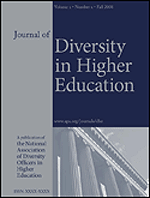
Journal of Diversity in Higher Education
Scope & Guideline
Unpacking Diversity: Insights for Higher Education
Introduction
Aims and Scopes
- Intersectionality in Higher Education:
The journal explores how various identity categories such as race, gender, sexuality, and socio-economic status intersect to influence students' experiences and outcomes in higher education. - Equity-Centered Research:
Research that focuses on equitable practices and policies aimed at improving access and success for underrepresented and marginalized student populations. - Cultural Competence and Inclusion:
Papers often discuss the development of cultural competence among educators and institutions to foster inclusive environments for diverse student bodies. - Student Activism and Advocacy:
The journal highlights the role of student activism in advocating for changes that promote equity and inclusion within educational institutions. - Critical Pedagogy and Curriculum Development:
Research that examines how curricula can be designed to reflect diverse perspectives and promote social justice within educational frameworks. - Mental Health and Well-Being:
The journal addresses the mental health challenges faced by diverse student populations, emphasizing the importance of supportive environments.
Trending and Emerging
- Intersectional Approaches to Identity:
There is an increasing emphasis on research that examines how multiple identities intersect to affect student experiences, highlighting the complexity of identity in higher education. - Mental Health and Well-Being of Marginalized Students:
Growing attention is being paid to the mental health challenges faced by diverse student populations, acknowledging the impact of systemic inequities on well-being. - Critical Race Theory and Anti-Racism:
Papers exploring critical race theory and anti-racist practices are gaining traction, reflecting a broader societal focus on racial justice. - Community and Institutional Support Systems:
Research is increasingly focusing on how community and institutional support can enhance the success and retention of marginalized students. - Technology and Online Learning Equity:
As education becomes more digital, there is a rising interest in how technology can either bridge or exacerbate the gaps in equity for diverse student populations. - Activism and Social Justice in Higher Education:
There is a trend towards examining the role of student activism and social justice movements in shaping institutional policies and practices.
Declining or Waning
- Traditional Diversity Training Programs:
There appears to be a decreasing focus on conventional diversity training programs, which are often criticized for their ineffectiveness in fostering genuine change and inclusiveness. - Generalized Student Demographics:
Research that addresses broad student demographic statistics without a critical lens on intersectionality or specific experiences of marginalized groups is less frequently published. - Outdated Models of Diversity:
Older models of diversity that do not incorporate contemporary understandings of intersectionality and systemic inequities are being phased out in favor of more nuanced approaches. - Policy Analysis Without Contextual Frameworks:
Papers that analyze diversity policies without a critical examination of their implementation and impact on specific populations are less prevalent. - Single-Issue Focus:
There is a waning interest in research that addresses diversity issues in isolation, rather than through an intersectional or holistic lens.
Similar Journals

Journal of Student Affairs Research and Practice
Empowering educators with cutting-edge findings in student affairs.Journal of Student Affairs Research and Practice is a distinguished publication dedicated to advancing knowledge in the field of higher education student affairs. Published by Routledge Journals, Taylor & Francis Ltd, this journal serves as a vital platform for researchers, practitioners, and educators to explore innovative practices and policies that enhance student development and engagement. With an impact factor reflective of its significance in education, it holds a reputable Q2 category ranking, further underscoring its contributions to the academic discourse surrounding student affairs. The journal invites rigorous research articles, theoretical explorations, and empirical studies that address the complex landscape of student experiences in higher education settings. Operating without an open access model, the journal aims to bridge gaps between research and practice, providing valuable insights for professionals and fostering informed decision-making in student affairs. For those committed to shaping the future of student engagement, the Journal of Student Affairs Research and Practice offers a comprehensive resource for the latest findings and trends in the field, making it essential reading for all stakeholders within the educational community.

International Journal of Educational Management
Fostering Knowledge for Strategic Educational PracticesInternational Journal of Educational Management, published by Emerald Group Publishing Ltd., stands as a premier platform for the dissemination of research in the fields of education and organizational behavior. With an ISSN of 0951-354X and an E-ISSN of 1758-6518, this journal has been at the forefront of academic inquiry since its inception in 1987 and continues to thrive with converged publication years extending to 2024. The journal is ranked in the Q2 quartile for both Education and Organizational Behavior and Human Resource Management as of 2023, highlighting its significant impact within these domains. Notably, its Scopus ranking places it within the top 20% of journals in Social Sciences - Education and the top 38% in Business Management and Accounting. With access options currently set to non-open access, the journal serves as a crucial resource for academicians, practitioners, and students seeking to enhance their understanding of effective educational management and its strategic implications. The commitment to advancing knowledge and practice makes the International Journal of Educational Management an essential citation for those dedicated to fostering excellence in educational environments.
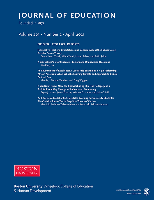
Journal of Education-US
Shaping the landscape of education for tomorrow's leaders.Journal of Education-US, published by SAGE Publications Inc, is an esteemed academic journal dedicated to advancing the field of education through rigorous research, theoretical discourse, and diverse methodologies. With both print (ISSN: 0022-0574) and digital (E-ISSN: 2515-5741) formats available, this journal serves as a vital resource for educators, researchers, and policy-makers alike. The journal is classified in the Q2 quartile for Arts and Humanities and Q3 for Education as of 2023, reflecting its influence within the academic community. It holds a respectable rank of #908 out of 1543 in the Scopus database within the Social Sciences Education category, indicating its relevance and contribution to ongoing debates and innovations in educational practices and theories. While not currently an open-access journal, its carefully curated articles provide valuable insights and foster critical discussions that drive the education sector forward. With a publication span from 2005 and ongoing, the Journal of Education-US remains a cornerstone for impactful scholarship in education.

Journal of Higher Education Policy and Management
Connecting Scholars to Shape Educational FuturesJournal of Higher Education Policy and Management is a peer-reviewed academic journal dedicated to advancing the field of higher education through rigorous research and innovative policy analysis. Published by Routledge Journals, Taylor & Francis Ltd, this esteemed journal boasts a distinguished Q1 ranking in both the Education and Public Administration categories as of 2023, solidifying its status as a leading publication in its field. With an impact factor positioning it favorably in the realm of social sciences, the journal provides a platform for scholars, practitioners, and policymakers to share their insights and best practices. The journal spans a broad scope, addressing critical issues and trends from 2003 to 2024, thus ensuring its relevance to current and emerging educational strategies. By fostering an interdisciplinary dialogue, the Journal of Higher Education Policy and Management plays a vital role in shaping the future of higher education globally, making it an essential resource for researchers, professionals, and students alike.
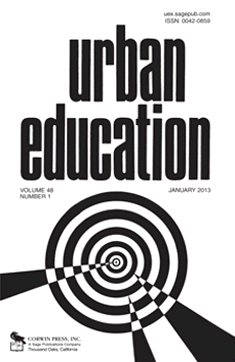
URBAN EDUCATION
Shaping Policies for a Brighter Urban Future.URBAN EDUCATION, published by SAGE Publications Inc, stands at the forefront of the fields of education and urban studies. With a history dating back to 1965 and a converged publication reach extending to 2024, this journal plays a pivotal role in disseminating research that addresses the complexities of urban educational environments. Holding prestigious Q1 rankings in both education and urban studies categories, and boasting an impressive Scopus ranking, URBAN EDUCATION is recognized for its high impact on scholarly discourse and policy development. The journal aims to provide a platform for cutting-edge research that informs practice, enhances educational policy, and contributes to the improvement of educational outcomes in urban contexts. While it currently does not offer open access options, the rich content and critical insights produced within its pages remain invaluable to researchers, professionals, and students committed to addressing the myriad challenges in urban education.

Cambridge Journal of Education
Connecting research and practice for impactful education.The Cambridge Journal of Education, published by Routledge Journals, Taylor & Francis Ltd, stands as a pivotal platform for scholarly discourse in the field of Education. With a distinguished history spanning from 1971 to 2024, this journal encompasses a diverse array of educational research, ranging from policy analysis to pedagogical innovations. Notably, it enjoys a prominent Q1 status in the Education category, reflecting its high impact and prestige within the academic community, as evidenced by its ranking of #251 out of 1543 in Social Sciences Education on Scopus, placing it in the 83rd percentile. Although access is not open, the journal offers valuable insights and empirical studies that aim to inform educators, researchers, and policymakers alike. With an ISSN of 0305-764X and E-ISSN of 1469-3577, the Cambridge Journal of Education is an essential resource for those committed to advancing the understanding and practice of education globally.
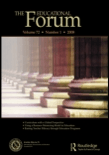
EDUCATIONAL FORUM
Connecting Scholars to Transform Educational LandscapesEDUCATIONAL FORUM, published by Routledge Journals, Taylor & Francis Ltd, is a premier academic journal that serves as a vital platform for innovative research and discourse in the field of education. With an ISSN of 0013-1725 and an E-ISSN of 1938-8098, this journal has been at the forefront of educational scholarship since its inception in 1936, continuing to disseminate critical insights through 2024. Recognized in the Q2 category of education in 2023, it holds a Scopus rank of 768 out of 1543 in the social sciences, placing it in the 50th percentile overall. Though it does not offer open access, the journal provides an essential resource for researchers, professionals, and students aiming to expand their understanding of current educational practices, policies, and innovations. By fostering an academic environment rich in rigorous analysis and thoughtful discussion, EDUCATIONAL FORUM plays an indispensable role in shaping the future of education.
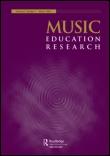
Music Education Research
Fostering Excellence in Music PedagogyMusic Education Research is a prestigious journal dedicated to advancing scholarship in the field of music education, published by Routledge Journals, Taylor & Francis Ltd. With a significant impact factor reflected in its Q1 ranking in Music and Q2 in Education for 2023, this journal is a critical resource for researchers, educators, and practitioners alike. It consistently ranks high in both the Arts and Humanities and Social Sciences categories, with an impressive position of Rank #8 in Music out of 180 journals, indicating its influence in shaping contemporary discourse. Aimed at fostering innovation and critical examination within music education, Music Education Research invites submissions that explore a broad spectrum of topics, encompassing pedagogical practices, policy implications, and curriculum development. Operating from the United Kingdom, the journal provides a vital platform for sharing cutting-edge research and is committed to improving music learning experiences across various educational contexts.

Yuksekogretim Dergisi
Elevating Pedagogical Insights for Future Generations.Yuksekogretim Dergisi, published by TUBA-Turkish Academy of Sciences, is a pivotal platform in the field of higher education research, offering a critical lens on innovative educational practices, academic policies, and pedagogical advancements. Although specific impact metrics such as H-Index and Scopus ranks are currently unspecified, the journal's commitment to publishing high-quality, peer-reviewed articles positions it as a significant contributor to the discourse surrounding higher education in Turkey and beyond. With an ISBN of 2146-796X and an E-ISSN of 2146-7978, Yuksekogretim Dergisi invites researchers, professionals, and students to engage with contemporary issues in the realm of university education, explore scholarly insights, and contribute to the evolving practices within the academic landscape. The journal serves as an Open Access resource, enhancing accessibility to knowledge and fostering a collaborative educational environment.

Art Design & Communication in Higher Education
Innovating Pedagogy through Artistic ExpressionArt Design & Communication in Higher Education, published by INTELLECT LTD, is a pivotal journal that explores the intersection of creativity and pedagogy within higher education. With an ISSN of 1474-273X and E-ISSN 2040-0896, this journal has carved a niche in the field, achieving notable rankings in various categories, including Q2 in Arts and Humanities and Q3 in Communication for 2023. Covering converged years from 2012 to 2024, it aims to foster scholarly discourse on innovative practices, research methodologies, and frameworks that enhance teaching and learning experiences in art and communication disciplines. Despite not being an open access publication, the journal remains a significant resource for educators, researchers, and practitioners seeking to engage with progressive theories and applications in the arts and educational communication. Consistently recognized for its contributions, it ranks in the 89th percentile within General Arts and Humanities, highlighting its importance as a leading platform for relevant scholarly work.